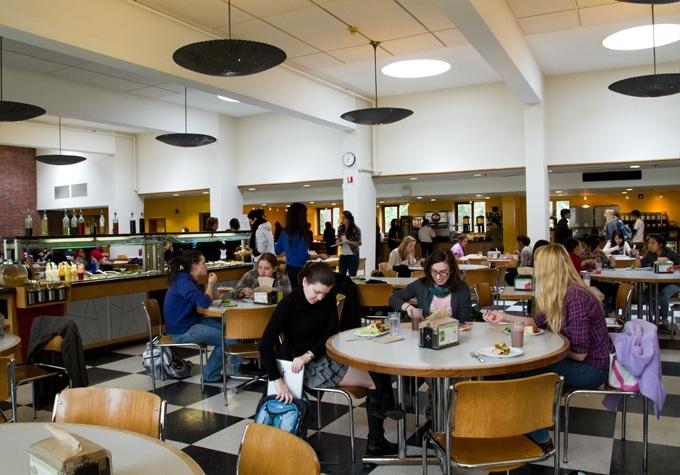The unique dining hall program at Wellesley College has garnered much attention from critics and proponents alike. The honor code based meal plan allows students the freedom to come and go at leisure throughout the day, necessitating card swipes only at the Lulu Chow Wang Campus Center solely for headcount purposes.
Many claim the revolutionary program levels the field for students, as everyone is charged a flat rate for the same dining hall access; at roughly $14 per meal per three-meal-day, however, the system also charges students much more than what they would have paid for food without a meal plan at all.
It’s not so easy, though, to get off the program. Students with extreme allergies face near impossible bureaucratic hurdles in the pursuit of freedom from Wellesley Fresh. Others attempting to remove themselves from the plan for financial reasons are faced with the prospect of lowered aid and limited affordable food options in the Ville.
In a bid to appease students critical of the system, the plan allows for a semesterly $50 free in select campus cafes. The prices at these establishments are extraordinary; given the college’s tricky location in the wealthiest part of Massachusetts, the high costs only sort of make sense. If the system were truly meant to level the field for poorer students, however, the prices could certainly be lower.
Paying an amount Business Insider refers to as ¨shockingly expensive,¨ you’d think students would at least be provided with reliable nutritional information for each menu option. On the oft-buggy website which glitches through mobile phone access, it seems only a small portion of meals have even a minimal amount of nutritional information.
A common complaint in anonymous online forums such as Wellesley’s unofficial Facebook page Uncensored Confessions is the development of binge eating as the result of unfettered dining hall access. The lack of information online only adds to their stress. Some students with other eating disorders even choose to skip meals rather than face the prospect of consuming unknown calories.
The system is also inequitable for students from families who never taught or valued physical health. Thrown into independence, these students struggle to develop healthy habits unaided by buffet-style dining halls and unclear ingredient lists.
To claim that the organization of Wellesley’s dining hall system is without benefits would be to make a sizable mistake. Our ability to swipe in a limited number of guests per semester for free, for example, has saved me more than once; in addition, the workers at Wellesley Fresh seem to be of the kindest and most helpful individuals I’ve met. And the food, for the most part, tastes great.
There must be some solution other than complete overhaul — can we hire data-minded students to enter more online information? Could we forgo our free consolation $50 and knock down the overall meal plan price?
With all its talk of keeping students’ interests in mind, Wellesley manages to avoid all conversation surrounding its highly contested dining hall system. And sure, there are arguably greater student equity problems on hand; the college, like its students, has a lot on its plate.
But the Wellesley dining hall problem extends itself into many more facets of daily student life. Our nutritional health affects our physical health — and this further affects our academic performance, mental health and general standard of living. In this case, it does seem that we are what we eat. Wellesley College, please listen.





G | Feb 20, 2019 at 6:12 pm
While I do think there are some problems with the system, a problem with eating disorders seems like something that needs to be addressed at health services? (Despite their need for overhaul).
Is there a type of system that would help prevent binge eating?
There are also nutritionists that are available to meet!